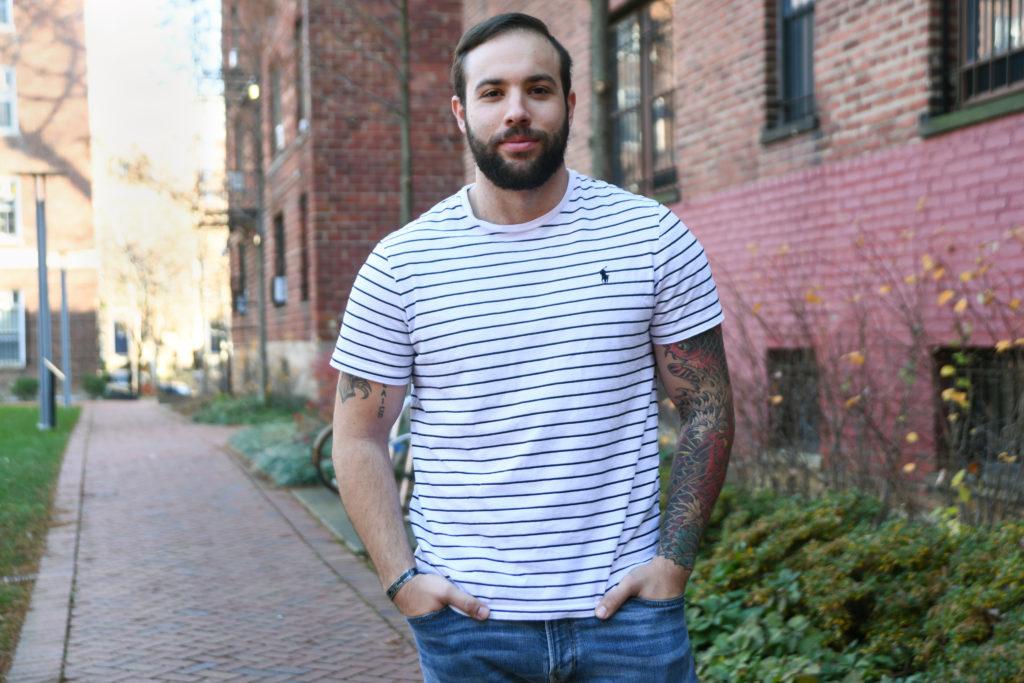Updated: Dec. 4, 2017 at 8:30 a.m.
Senior Tyler McManus was 22 years old when he walked into a first-year University Writing class three years ago as a veteran with a beard and a sleeve of tattoos – standing out from the freshmen who filled most of the seats in the Mount Vernon Campus classroom.
Now 25, McManus said there is a “stigma” separating him from his younger classmates who often don’t view him as a peer.
“People would walk their own separate ways walking down the street and I would just get looked at like, ‘who is this person at GW that doesn’t fit in?’ So it was drastic,” he said.
In interviews, nine undergraduate students older than 24 said they often feel disconnected from the rest of campus because of their age. Many said they face greater difficulties socializing with and relating to younger peers – a long-running issue among this student population.
Last year, 9 percent of GW undergraduates were older than 24 – up slightly from about 7 percent in 2012, according to statistics from the Department of Education.
Older undergraduate students comprise 30 percent of university populations nationwide, according to a New York Times report. But their advanced life experience detaches them from staples of undergraduate social life and involvement with student organizations, which primarily accommodates youthful undergraduates, experts said.
Associate Dean of Students Tim Miller said the University seeks to create communities for older undergraduates, who have often served in the military or have taken years off to volunteer or work to save up money for a college education.
“No matter what a student’s age, we seek to support every student in helping that individual find their community in the residence halls, the classroom and through a range of involvements such as Greek life and student organizations,” Miller said in an email.
Senior Hillary Hicken, 25, came to GW after she had already worked several full-time jobs, earned an associate’s degree at a community college in Texas and took an additional year off to save up money for GW after she graduated from high school.
As a freshman, Hicken said her friend group included seniors, who she said she could relate to because they were more mature. But as she gravitated toward older students, she further detached herself from younger students in her graduating class.
“Obviously you’re 18, you’re growing, you’re maturing, you’re trying to figure out who you are, but I’d already done all of that aspect of my life, so I was already set in who I am,” she said. “It was just more difficult than it was being with older students.”
Alumnus Steven Shao, 25, said the disconnect he felt with younger peers was natural because older students came from different experiences and backgrounds, might be financially independent and would rather go to bars at their legal age than an on-campus party.
“It’s just 18, 19 – this is their life experience. Conversation, I think, is the most obvious giveaway – how much they talk about high school,” Shao, who graduated in May, said. “Whereas the older folks here say, ‘I went here, I traveled here, I did this before coming to GW,’ that would be the difference.”
Junior Jesse Robinson, 26, who took time off before college to serve in the U.S. Navy, said he talks to younger students to discuss homework or class assignments, but his involvement with GW Veterans, a student-run advocacy organization, is his primary outlet for socialization. GW Veterans said at the beginning of the academic year that the group wanted to host more events with other student organizations to build connections with the rest of campus.
Robinson said sometimes he feels he is at a disadvantage because his younger peers’ friendships give them solid support systems and study partners to make them better prepared for exams.
“I’ve never walked to class with somebody, and I’ll be sitting there in a classroom, and I’ll be looking at the door, and everyone is walking in with somebody they know, and I don’t want to say it must be nice, but it must be nice,” he said.
Experts said most often, older undergraduates are separated from their peers because they have had more life and work experiences. They said getting these nontraditional students involved in University events can help close the gap between the groups.
Casey Maliszewski Luksco, the program coordinator for transfer and off-campus student life at the University of Maryland, said nontraditional undergraduates usually start college later in life because they might want to start a family, save up for college or serve in the military. She said those experiences diversify the student population on campus and bring “valued expertise” to the classroom.
“Thinking about that gateway into their experiences as well, and keeping them in mind because it’s a growing population of students that we need to serve and we need to make sure we’re thinking about their needs,” she said.





